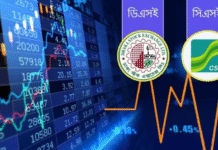Finance minister AHM Mustafa Kamal on Wednesday blamed delay in installation of electronic fiscal devices by the National Board of Revenue for poor revenue collection in the first four months of the current fiscal year.
‘The NBR chairman informed early this year that the task [installation of EFDs] would be completed by July. Now the chairman is saying that the machines would be installed from December,’ he said.
Kamal was talking to reporters about the country’s overall economy after a meeting of the cabinet committee on national purchases at the secretariat.
He said that the collection of VAT was most crucial for the NBR to achieve the overall revenue target of over Tk 3 lakh crore in the current fiscal.
At a meeting of the coordination council on macro economy and budget management held on Monday, the government’s economic policymakers expressed worry as the revenue earnings shortfall in the first four months of fiscal 2019-20 exceeded Tk 40,000 crore, standing at around Tk 65,000 crore in July-October.
Amid the poor revenue growth, the government’s borrowings from the banks soared by 43.98 per cent or Tk 39,331.47 crore year-on-year on September 24 of this fiscal.
Kamal earlier on Wednesday said that the remittance inflow in the country would grow by 25 per cent year-on-year in the current fiscal year 2019-20.
‘Remittance is the driving force of our economy. So, the government has taken different initiatives, including the provision of 2-per cent cash incentive, for increasing the flow of remittance,’ he said while talking to reporters after a meeting with a United Arab Emirates delegation led by UAE charge d affairs Abdulla Ali AlHmoudi at the finance ministry.
The minister said that the Bangladeshi expatriates had sent $6,154.22 million in remittance in the first four months of the current fiscal 2019-20, which was 20.48 per cent higher than the amount sent in the corresponding period of the preceding year.
The country received $5,108 million in remittance during the July-October period in 2018-19 fiscal.
The minister said that the government was giving 2-per cent cash incentive on money remitted by Bangladeshi expatriates.
He also said that anyone could send remittances up to $1500 per transaction without document.
At the meeting, RAK Bank of the United Arab Emirates proposed to assist state owned Janata Bank with remittance sent home by Bangladeshi expatriates living in the desert kingdom, he said.
Kamal said that RAK had made the proposal to ensure higher inflow of remittance from its home country.
The UAE is the second largest source of remittance for Bangladesh after Saudi Arabia with Bangladeshi expatriates sending $2.5 billion from the UAE in 2018-19 fiscal.
According to the Bangladesh Bank, the Bangladeshi expatriates sent $3.1 billion from Saudi Arabia in the same fiscal year.
A large amount of remittance generated in the UAE by the Bangladeshi expatriates had come through Janata Bank’s four branches in the UAE.
Replying to whether the proposed pact would affect the business of Janata, Kamal said that there was no such possibility.
He said that the proposed agreement would help Janata to tap more remittance with the help of RAK in areas where the state-bank had no presence.
Still, he said, Janata would examine the proposal before signing the agreement.
Source: New Age.









